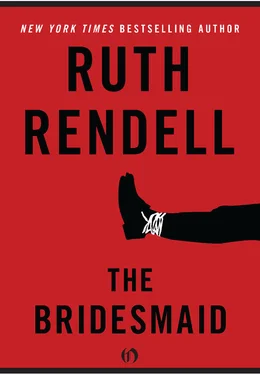Ruth Rendell - The Bridesmaid
Здесь есть возможность читать онлайн «Ruth Rendell - The Bridesmaid» весь текст электронной книги совершенно бесплатно (целиком полную версию без сокращений). В некоторых случаях можно слушать аудио, скачать через торрент в формате fb2 и присутствует краткое содержание. Год выпуска: 2010, Издательство: Open Road Integrated Media LLC, Жанр: Триллер, на английском языке. Описание произведения, (предисловие) а так же отзывы посетителей доступны на портале библиотеки ЛибКат.
- Название:The Bridesmaid
- Автор:
- Издательство:Open Road Integrated Media LLC
- Жанр:
- Год:2010
- ISBN:нет данных
- Рейтинг книги:3 / 5. Голосов: 1
-
Избранное:Добавить в избранное
- Отзывы:
-
Ваша оценка:
- 60
- 1
- 2
- 3
- 4
- 5
The Bridesmaid: краткое содержание, описание и аннотация
Предлагаем к чтению аннотацию, описание, краткое содержание или предисловие (зависит от того, что написал сам автор книги «The Bridesmaid»). Если вы не нашли необходимую информацию о книге — напишите в комментариях, мы постараемся отыскать её.
The Bridesmaid — читать онлайн бесплатно полную книгу (весь текст) целиком
Ниже представлен текст книги, разбитый по страницам. Система сохранения места последней прочитанной страницы, позволяет с удобством читать онлайн бесплатно книгу «The Bridesmaid», без необходимости каждый раз заново искать на чём Вы остановились. Поставьте закладку, и сможете в любой момент перейти на страницу, на которой закончили чтение.
Интервал:
Закладка:
Why had he got the idea into his head that Arnham meant only to drive them as far as Buckhurst Hill station? Nothing had been said. Perhaps he really was in love with Christine and put himself out for her as a matter of course. Or it might be that he felt under an obligation on account of Flora. Philip thought the earlier awkwardness had quite passed. Christine sat in the front and chatted to Arnham about the neighbourhood and where she used to live and where she now lived and about whether or not she should take up hairdressing again, which had been her job before she was married. Because they needed “a bit more coming in,” which was all very artless but made Philip wince. It did seem as if she were throwing herself at him. She was really “waiting to see what happened” before she definitely made up her mind to start a hairdressing business from home.
Arnham talked pleasantly enough about his own plans. The house had to be sold and all the furniture. He and his ex-wife had agreed it should be auctioned with all its contents, and he hoped this might happen while he was out of the country on business. A flat wouldn’t suit him, he would have to buy himself another house, but in the same district or not far away. What did Christine think of Epping?
“I used to go to Epping Forest on picnics when I was a child.”
“You’ve been very near Epping Forest today,” Arnham said, “but I meant Epping itself. Or Chigwell even. I might stand a chance of finding a smaller place in Chigwell Row.”
“You could always come up our way,” said Christine.
Cricklewood, that was, and Glenallan Close, where Christine, newly widowed, had been obliged to move. The most optimistic of estate agents would hardly have called it desirable. Philip reminded himself that Arnham had been there before, the clumps of red-brick houses with their flat metal-framed windows, pantiled roofs, wire fences, and skimpy gardens would come as no shock to him. Darkness and the shining mist from street lamps shrouded in leaves concealed the worst. It was no slum. It was only poor and barren and shabby. Philip and Fee and Cheryl, as if by mutual understanding, hurried into the house, leaving Christine and Arnham to make their farewells. But Christine was very quick about it, running up the path just as the front door came open and Hardy rushed out, hurtling himself at her with yelps of joy.
“What did you think of him? Did you like him?” The car had scarcely gone. Christine stood watching it depart, Hardy in her arms.
“Yes, he’s okay.” Fee, on the settee, was hunting for the latest on the Rebecca Neave affair in the Evening Standard.
“Did you like him, Cheryl? Gerard, I mean.”
“Me? Sure, yeah. I liked him. I mean, he’s okay. He’s a lot older than Dad, isn’t he? I mean, he looks older.”
“I put my foot in it, though, didn’t I? I realised as soon as we were in the door. I’d said to him, ‘You must meet my children sometime,’ and he sort of smiled and said he’d like to and the next thing he said was to come over to his house next Saturday, and I don’t know why, I took it he meant all of us. But of course he didn’t, he meant me alone. I felt awful. Did you see that little table laid for just two with the flower and everything?”
Philip took Hardy round the grid of streets before going to bed. He came in the back way and stood there for a moment, looking at the empty space by the birdbath on which light from the kitchen window was shed, where Flora had stood. By then it was too late to undo what had been done. Returning to Buckhurst Hill on the following day, for instance, and retrieving Flora—that would have been too late.
In any case, he had no feelings of that sort then, only a sense that things had been mismanaged and the day wasted.
CHAPTER TWO
A postcard came with a picture on it of the White House. This was less than two weeks after the visit to Buckhurst Hill, and Arnham was in Washington. Christine had been typically vague about what job he did, but Philip found out that he was export manager for a British company in a building near the head office of Roseberry Lawn. Fee brought in the post on Saturday morning, noting the name of the addressee and the stamp but honourably not reading the message. Christine read it to herself and then read it aloud.
“‘Have come on here from New York and next week shall be in California, or “the Coast” as they call it over here. The weather is a lot better than at home. I have left Flora to look after the house! Love, Gerry.’”
She put the card on the mantelpiece between the clock and the photograph of Cheryl holding Hardy as a puppy. Later in the day Philip saw her reading it again, with her glasses on this time, then turning it over to look closely at the picture as if in the hope of seeing some mark or cross Arnham might have made there, indicative of personal occupancy or viewing point. A letter came in the following week, not an air letter but several sheets of paper in an airmail envelope. Christine didn’t open this in company, still less read it aloud.
“I think that was him on the phone last night,” Fee said to Philip. “You know when the phone went at—oh, it must have been all of eleven-thirty. I thought, who’s ringing us at this hour? Mum jumped up as if she’d been expecting it. But she went straight to bed afterwards and she never said a word.”
“It would have been half-past six in Washington. He’d have finished his day’s work and be ready to go out for the evening.”
“No, he’ll be in California by this time. I worked it all out, it would have been early afternoon in California, he’d just have had his lunch. He was on the phone for ages, it was obvious he didn’t care what it cost.”
Philip thought, though he didn’t say so, that Arnham would have put the cost of phone calls to London on his expense account. The fact that he had had plenty to talk to Christine about was more significant.
“Now Darren and I have fixed on next May for getting married,” Fee said. “If he and Mum got engaged at Christmas, why shouldn’t we be married at the same time? I don’t see why you shouldn’t have this house, Phil. Mum won’t want it, you can tell he’s rich. You and Jenny could take over this house. I mean, I suppose you and Jenny will get married one day, won’t you?”
Philip only smiled. The idea of the house was inviting and something he had never thought about before. He wouldn’t have chosen it, but it was a house, it was somewhere to live. That this was a real possibility he came to see more and more. His fears that their unexpected invasion of his house might have changed Arnham’s feelings for Christine or at least made him proceed with caution seemed unfounded. No more postcards arrived, and if there were letters, Philip didn’t see them; but another late phone call came, and a few days later Christine confided in him that she had had a long conversation with Arnham during the afternoon.
“He has to stay on a bit longer. He’s going to Chicago next.” She spoke on a note of awe, as if Arnham were contemplating a space tour to Mars or as if the Valentine’s Day massacre had taken place quite recently. “I hope he’ll be all right.”
Philip was never indiscreet enough to say anything about the house to Jenny. He managed to contain himself even when one evening, as they were walking back from the cinema along an unfamiliar street, she pointed out a block of flats where several were advertised to let.
“When you’ve finished your training …”
It was a flat ugly building, about sixty years old, with peeling art deco adornments over the front entrance. He shook his head, said something about an exorbitant rent.
She held on to his arm. “Is it because of Rebecca Neave?”
Читать дальшеИнтервал:
Закладка:
Похожие книги на «The Bridesmaid»
Представляем Вашему вниманию похожие книги на «The Bridesmaid» списком для выбора. Мы отобрали схожую по названию и смыслу литературу в надежде предоставить читателям больше вариантов отыскать новые, интересные, ещё непрочитанные произведения.
Обсуждение, отзывы о книге «The Bridesmaid» и просто собственные мнения читателей. Оставьте ваши комментарии, напишите, что Вы думаете о произведении, его смысле или главных героях. Укажите что конкретно понравилось, а что нет, и почему Вы так считаете.











